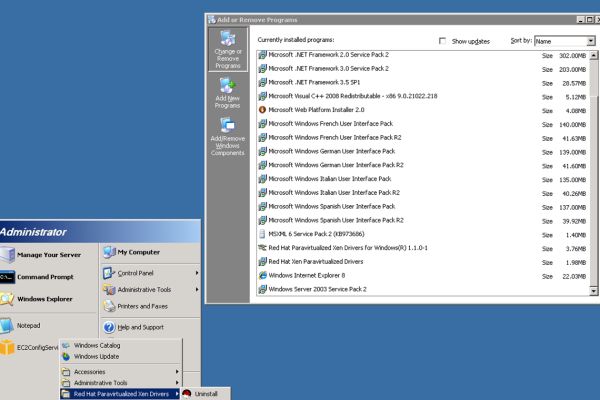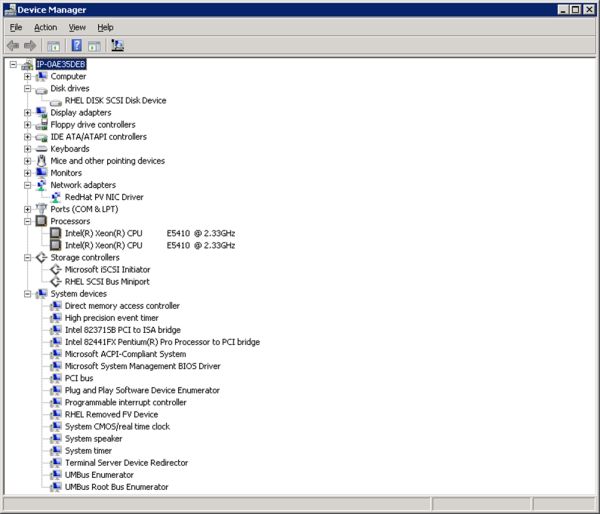Ask the experts: Cloud Computing Questions Answered
by Johan De Gelas on March 28, 2011 7:25 AM EST- Posted in
- Ask the Experts
- CPUs
- Cloud Computing
What Would the Benefits and Disadvantages Be for Moving a Site like AnandTech to Amazon EC2?
It is very easy to startup an Amazon EC2 instance. An instance is a combination of a certain amount of virtual hardware running on top of Xen and an operating system “template”. All instances have the right Xen drivers already installed, so that saves some time. Below you can see the Windows 2003 instance with the Xen paravirtualized drivers installed.
You simply browse to the website, choose the right instance and pay with your credit card.
It is also relatively easy to make an Amazon EC2 based site scale out quickly, so sudden peaks (e.g. Anand writing about the newest SSD) are not a problem anymore. And you pay only for the time and the resources that you actually use. That is a huge advantage compared to buying and maintaining enough servers to handle some hard to predict peak load.
However, there are some disadvantages too. Amazon’s EC2 "normal" disk performance is pretty bad, even sequential access gets hardly past 20-30 MB/s. Typical disk performance with a bit of random and sequential access is sometimes as low as 3 MB/s.
Secondly, most processors in the Amazon datacenter are Xeon 53xx “Clovertown” and Xeon 54xx “Harpertown”. And despite the fact that most of them are running at 2.33 GHz, an EC2 compute unit is no more than half a core, or a Xeon running at 1.2 GHz.
Thirdly, you better size your “normal” virtual machine very well, because there is a huge difference between the pricing for a small, medium or large instance. A large instance easily costs three times as much as a medium one.
One last tip: make sure your webservers run on linux. A linux instances costs about 50% less than a Windows one!












40 Comments
View All Comments
coda6 - Monday, March 28, 2011 - link
What type of compliance/audit data is available and how do they auditors access?Philippe Creytens - Monday, March 28, 2011 - link
Coda6,Our company was mentioned in the article and I picked up the article via Google Alerts. We have a couple of Google Alerts running for key words like our company name Romneya and/or competitors. So far the introduction...
I don't exactly understand your question, but there are two topics I would like to point out: Google Apps for Business, as it is called now, is FISMA certified (US Gov) and SAS70 type II. There is more info on http://www.google.com/a/.
Also do a quick google for the Google Apps Security Whitepaper. It explains how Google deals w/ security.
If you mean internal auditing, there is the Google Apps Audit API. It allows Google Apps administrators to audit a user's email, email drafts, and archived chats. This API can be used only for lawful purposes in accordance with the Customer Agreement.
In the Google Marketplace you can find 3rd party applications (based on the API).
--Philippe
Ed051042 - Monday, March 28, 2011 - link
This is not very well written, certainly when compared to other AnandTech articles.You state: "E-mail must be about the most essential IT tool your employees have, so it is not wise to take any risk there." So, there's zero risk in using cloud email? Thirty seconds of research would argue otherwise.
bigboxes - Monday, March 28, 2011 - link
I was thinking the same thing. Just last week Google announced that many had lost access to their e-mail accounts. Google downplayed it, but it just goes to show what could happen when you put your data in someone else's hands.igf1 - Tuesday, March 29, 2011 - link
Right, not only catastrophic failure as an outstanding risk, but the obvious security concerns that you might have. So, regarding a company which wont event disclose their layout, whom you have no control over internal policy, who could go out of business in a days notice and sell their severs + your data to question marks and I conclude, that hes right, I'm not leaving it to chance.JohanAnandtech - Wednesday, March 30, 2011 - link
I have done 30.000 seconds of research or more. I have seen tens of on premise exchange servers. None of them come close to the availability of Gmail for businesses. Many of them reboot frequently (initiated by the sysadmin), get in trouble after patches or electrical outages and so on.KentState - Wednesday, May 18, 2011 - link
You must have seen some pretty bad implementations. In 15 years of IT experience, I've only seen a single outage of Exchange and that in 2001 due to a virus. Secondly, the time it takes to administrate Exchange is exaggerated.BF04 - Monday, March 28, 2011 - link
You praise Google for their business e-mail. However you do not discuss details about it and or any other competition. What about MS cloud services? What about the risk factor, management of employee's email?This reads like an ad for Google.
Philippe Creytens - Monday, March 28, 2011 - link
BF04There are 3 (large) companies actively promoting 'the cloud' for mail/calendaring: Google (Apps), Microsoft (BPOS/Office365) and IBM/Lotus.
Which cloud offering is 'better'? It depends.
We see companies using (the more expensive) MS offering to avoid IT management and CAPEX/OPEX issues. Impact for the end user? Hardly any. He connects to a server for mail/calendar w/ the tools he/she has been using (Outlook/Office).
Other companies decide to move to Google because of its mainly-browser strategy, continuous updates and device independency (iPad, Android, Mac, Linux).
Impact to the end user? Bigger... at least for the initial couple of weeks as people don't like change.
Companies that need to share/collaborate beyond 'the firewall' would more likely go for Apps.
Irrelevant of the choice, in most cases companies move 'commodity IT' to the cloud because now many companies spend 80% of their IT budgets on 'keeping the lights on'. Not on innovation or drive growth.
http://www.gartner.com/it/page.jsp?id=497088
HMTK - Monday, March 28, 2011 - link
I want to add my 0.02 € to the criticism. The article isn't well written (actually far inferior to your other articles) and it nearly ignores the fact that Google Mail doesn't integrate with AD which is a huge drawback for many companies. It also doesn't take into account that bandwith still is expensive and not guaranteed unless you're willing to pay through the nose. And I think I'm not the only one who isn't keen on putting the company's data in some external cloud where you're never really certain who can access that data. Sure, company X may claim that your data is safe but this is a matter of trust and I'm too cynical I guess.